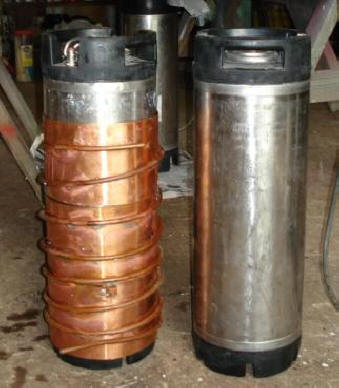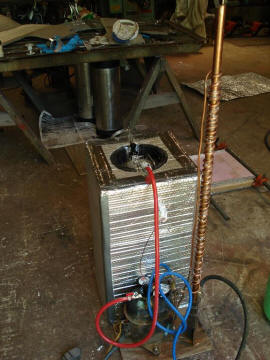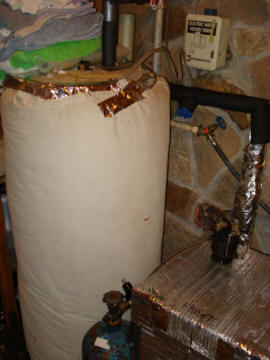Hot water, cold beer
| Solar Heat warms my domestic
water most of the year, except during cloudy periods. If these periods occur
during the winter, it may get cool enough in my solar heated home to fire up
the masonry stove, which heats my water also, but if it's not, then TVA 7.5
cents a KWH electric kicks in.
I recently decided to start kegging my homemade
beer, I've been bottling it for 30+ years, and washing bottles gets
old, but I had to figure a way for a conserver like me to chill the
"Corny Kegs" I'm using. Many home brewers use a dedicated fridge,
but I won't go there for energy and space reasons. I had an old
window air conditioner (AC) compressor, some copper flashing, and
copper tubing, so I put them all together to make a heat pump that
takes heat from the well insulated keg, and moves it into my
domestic water, no water pumps involved |
|
First I wound 3/8" copper
tubing around copper flashing that was soldered to just fit around the keg.
I soldered the tubing to the flashing, and built a well insulated box to
house the evaporator. I sized the evaporator and condenser coils by
guesswork, and the available lengths of tubing and space I had to work with.
I snipped a capillary tube from another junk AC I had scrounged. I used to
do refrigeration work, and have a 30lb bottle of R-22, which is the correct
refrigerant for the AC compressor. I had to buy a few fittings, but
otherwise had everything else already.

Beer keg with Doug's homemade evaporator coil would around it.
In the evaporator coil, liquid refrigerant is vaporized, a process that
absorbs
a lot of heat from the surroundings, cooling the beer keg.
It works well, thermosyphoning
heat to the water heater, with about a 50*F rise in temperature as it goes
through the water cooled condenser. It draws about 5.5 amps after the
initial start up surge, and ramps up some as the condenser temps go up. I
figure I can remove the insulated lid to the chiller during cloudy
conditions to heat water more efficiently than resistance heaters will,
maybe even remove the keg and put a small fan in. I've been monitoring it's
performance, and it's doing well, putting out water in the 140*F to 160*F
range, with 95*F water entering the heat exchanger. Those high temps are
lowered when that water gets into the tank, and that heat spreads out to the
cooler water in the tank. I will eventually put a thermostat in it to
maintain beer temps, and possibly wire it to the water heater thermostat to
come on instead of the heaters elements.
|
Click picture to enlarge

The insulated beer keg, compressor
and heat exchanger.
The condenser (1/4 inch copper tube
wrapped around the 3/4 inch copper water pipe)
transfers heat from the hot refrigerant
to the domestic water flowing through the
3/4 inch water pipe -- this cools and liquefies
the refrigerant preparing it for
another
trip through the evaporator to cool the beer.
|
Click picture to enlarge

Water circulates from the bottom of
the hot water tank through the
copper tube heat exchanger and
back to the top of the hot water tank.
No pump is used -- just the natural
convection due to density change
of the heated water. |
I now have four ways to heat my
domestic water-Solar is my primary source, in winter, after several cold
cloudy days I burn wood to heat my home, which also heats water, now I
have the beer chiller heat pump, and finally there is the electric
resistance heater as final backup.
Doug's Other Projects
Doug has contributed a number of
projects to Build-It-Solar covering a wide range of solar and
renewable energy areas --
see them all...
Thanks very much to Doug for
providing this material!
Doug
You can reach Doug at: dougkalmer AT gmail DOT com
(replace AT with @, and DOT with a period)
July 7, 2008
Another way of thinking about Doug's project is that it is a custom
made, well insulated, and efficient refrigerator in which the waste heat
produced by the refrigeration process is put to good use for heating
water. Not sure why you can't buy a commercial refrigerator that
does the same thing?
The
Wikipedia entry on Heat Pumps explains how heat pumps work ...



